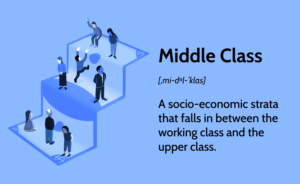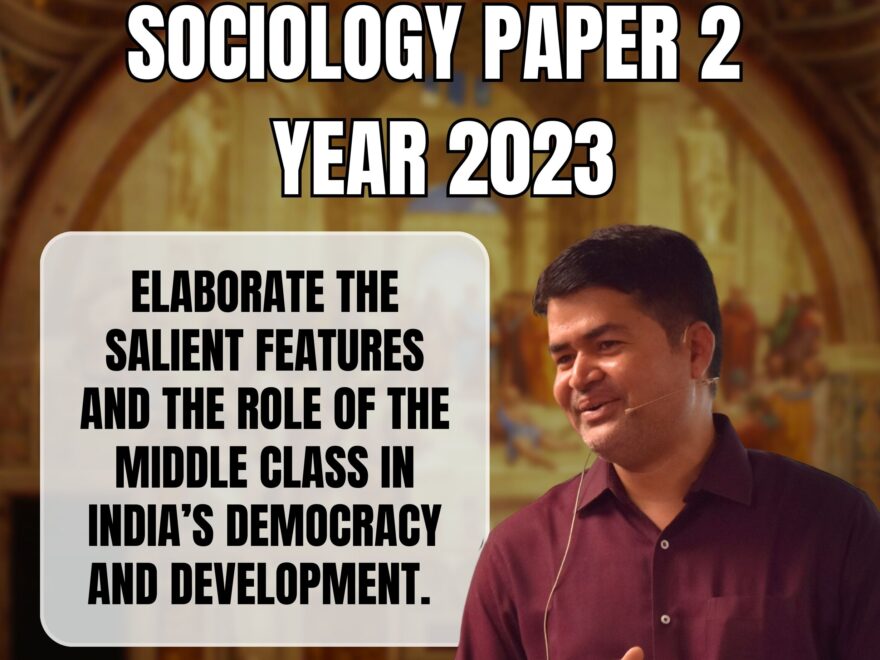Elaborate the salient features and the role of the middle class in India’s democracy and development.
Section: A.
Sociology Paper 2023 Analysis.
Paper 2: Unit-12 Social Structure; Social classes in India.

Question: 2 (b) Elaborate the salient features and the role of the middle class in India’s democracy and development.
(20 Marks)
| Introduction: Brief About the Rise of Middle Class.
Main Body: Salient Features of Middle Class in Terms of Various Phases of Evolution, Role of Middle Class in India’s Democracy and Development, Alternate View About Middle Class. Conclusion: Balanced Viewpoint About Middle Class. |
Introduction:
- Middle class can be defined as a social group which has a stable source of income, well educated, upwardly mobile and distinct from lower and upper class.
- The advent of the British in India and their policies led to the emergence of middle class. This transformation was marked by the introduction of various elements, including railways, administrative institutions, the press, and postal departments etc. In addition to this new class encompassed independent professionals such as lawyers, doctors, teachers, and journalists.
Main body:
Salient features of middle class
D. L. Seth has outlined the evolution of the middle class in India through four distinct phases, each characterized by specific features:
-
During initial phase of Colonial Period:
- The middle class in pre-British India was nascent and relatively small.
- It mainly consisted of traders, artisans, and local merchants, professionals, collectors. N. Srinivas has highlighted these were the people who have undergone primary westernisation.
- This class was not politically influential but played a role in sustaining local economies and small-scale trade. Racial arrogance of the British played a huge role in igniting Nationalistic consciousness among the middle classes.
- The introduction of modern education and administrative institutions by the British contributed to the growth of this class. They began to emerge as a politically conscious and vocal group.
-
During the Period of Renaissance:
- The middle class became more politically active and aware during the early 20th century.
- During this time the middle class has become harbinger of social reform movement and nationalistic movement.
- They were at the forefront of the Indian nationalist movement, actively participating in various protests, rallies, and agitations against British colonial rule.
- This period also witnessed the growth of the industrial and business middle class, comprising entrepreneurs and industrialists.
-
Post -Independence middle class:
- Post -independence in earlier decades this middle class played a huge role in nation building and building the foundation of a liberal, secular, progressive and democratic nation.
- After independence measures like land reforms, green revolution etc. led to the emergence of a new middle class. According to Pawan Verma these factors led to growth of middle class in rural areas. However this rural middle class is also oriented in urban occupations. Also new middle rural middle class is local in orientation and regional in character.
- Benefits of reservation also came to fruition. A new Dalit middle class also emerged due to forces of social mobility like education, jobs in administration, reservation in parliament and assemblies and jobs.
-
Middle class after LPG reforms:
- Globalisation, liberalisation, privatisation and neoliberal economic and social policies influenced lifestyle, life choices and life chances of a very large population.
- Urban based, English speaking and technically skilled sections of the population benefited most from the process of Globalisation facilitated through new economic policy.
- Thus emerged a new middle class which is employed in Multinational corporations.
Role of middle class in India’ s Democracy and Development:
- The middle class provided leadership to the National struggle for independence. Most of our leaders belonged to professional families.
- Middle classes formed the core of administrative machinery. Government has to build administrative set-up from scratch.
- Middle classes provided leadership and technical services in newly formed Public sector enterprises and establishment of Modern technical institutions.
Eg. Vikram Sarabhai founded INCOSPAR, IIM AHMEDABAD, led Atomic Energy Mission; Verghese Kurien & Tribhuvan Das Patel led Milk revolution; Homi J. Bhabha founded TIFR & Atomic Energy Establishment.
- According to Gurucharan Das middle class is open, dynamic, liberated, and de- ritualised. It is outgoing, risk taking and innovative. For example the success of Start Up India and emergences of Unicorns can be contributed to this middle class.
- According to T. K. Oommen Indian middle class is harbinger of silent revolution as it has through NGOs, PILs, raised the voice of poor and marginalised sections.
- According to Amartaya Sen middle class scrutinise the public policies, leads public debate and discourse and act as public think tanks.
- At the level of ideology also, the post-independence middle class was committed to social inclusion and equity. Middle class was committed to socialism and strategic autonomy symbolised in the policy of Non Alignment.
There are some alternate views also about the character and role of Indian middle class.
- According to Rajesh Kochar the new middle class is de nationalised.
- There is decline in social responsibility of new middle class. Also this middle class is not dependent on state protection. Hence least interested in actively participating in civil and political spheres.
- Also it is said that the middle class is consumption oriented and indulge in conspicuous consumption.
- According to Andre Beteille middle class is not homogenous in India. According to him Indian middle class has expanded in its western outlook still it carries hierarchical ideas.
Conclusion:
Indian middle class still in process of formation and characteristics are difficult to define. Though Indian middle class is sometimes criticised for being self -oriented and regional in outlook. But the contribution of Indian middle class in upholding the democratic tradition and leading the path of development cannot be denied.
Related Blogs…
To master these intricacies and fare well in the Sociology Optional Syllabus, aspiring sociologists might benefit from guidance by the Best Sociology Optional Teacher and participation in the Best Sociology Optional Coaching. These avenues provide comprehensive assistance, ensuring a solid understanding of sociology’s diverse methodologies and techniques.
META TAGS:
Middle Class in India, Democracy India, Development India, Indian Society, National Movement India, Indian Political Evolution, Social Reforms India, Globalisation Impact India, Urban Middle Class, Rural Middle Class, Indian Economic Reforms
Why Vikash Ranjan’s Classes for Sociology?
Proper guidance and assistance are required to learn the skill of interlinking current happenings with the conventional topics. VIKASH RANJAN SIR at TRIUMPH IAS guides students according to the Recent Trends of UPSC, making him the Best Sociology Teacher for Sociology Optional UPSC.
At Triumph IAS, the Best Sociology Optional Coaching platform, we not only provide the best study material and applied classes for Sociology for IAS but also conduct regular assignments and class tests to assess candidates’ writing skills and understanding of the subject.
Choose The Best Sociology Optional Teacher for IAS Preparation?
At the beginning of the journey for Civil Services Examination preparation, many students face a pivotal decision – selecting their optional subject. Questions such as “which optional subject is the best?” and “which optional subject is the most scoring?” frequently come to mind. Choosing the right optional subject, like choosing the best sociology optional teacher, is a subjective yet vital step that requires a thoughtful decision based on facts. A misstep in this crucial decision can indeed prove disastrous.
Ever since the exam pattern was revamped in 2013, the UPSC has eliminated the need for a second optional subject. Now, candidates have to choose only one optional subject for the UPSC Mains, which has two papers of 250 marks each. One of the compelling choices for many has been the sociology optional. However, it’s strongly advised to decide on your optional subject for mains well ahead of time to get sufficient time to complete the syllabus. After all, most students score similarly in General Studies Papers; it’s the score in the optional subject & essay that contributes significantly to the final selection.
“A sound strategy does not rely solely on the popular
Opinion of toppers or famous YouTubers cum teachers.”
It requires understanding one’s ability, interest, and the relevance of the subject, not just for the exam but also for life in general. Hence, when selecting the best sociology teacher, one must consider the usefulness of sociology optional coaching in General Studies, Essay, and Personality Test.
The choice of the optional subject should be based on objective criteria, such as the nature, scope, and size of the syllabus, uniformity and stability in the question pattern, relevance of the syllabic content in daily life in society, and the availability of study material and guidance. For example, choosing the best sociology optional coaching can ensure access to top-quality study materials and experienced teachers. Always remember, the approach of the UPSC optional subject differs from your academic studies of subjects. Therefore, before settling for sociology optional, you need to analyze the syllabus, previous years’ pattern, subject requirements (be it ideal, visionary, numerical, conceptual theoretical), and your comfort level with the subject.
This decision marks a critical point in your UPSC – CSE journey, potentially determining your success in a career in IAS/Civil Services. Therefore, it’s crucial to choose wisely, whether it’s the optional subject or the best sociology optional teacher. Always base your decision on accurate facts, and never let your emotional biases guide your choices. After all, the search for the best sociology optional coaching is about finding the perfect fit for your unique academic needs and aspirations.
Follow us :
🔎 https://www.instagram.com/triumphias
🔎https://www.youtube.com/c/TriumphIAS
https://t.me/VikashRanjanSociology
Find More Blogs…
| Compare and contrast Karl Marx’s and Max weber’s | Karl Marx- Historical Materialism |
| Talcott Parsons : Social system | Scope of the subject and comparison with other social sciences |


2 comments